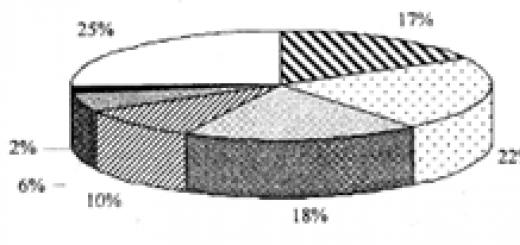That is, from September 1 this year, open and closed joint-stock companies will have to change their status to public or non-public.
Legislative requirements currently in force allow us to build a clear, understandable and logical hierarchy of requirements related to the disclosure by legal entities of information about their activities. The first group consists of basic requirements common to all open joint stock companies; then there are additional ones - for issuers who have prospectuses registered valuable papers; and, finally, special ones - for companies whose securities are admitted to circulation on the stock exchange. Within each of the three listed groups, fluctuations in one direction or another are allowed - for example, if an issuer is required to compile and disclose quarterly reports, this does not always mean that it must compile and disclose consolidated financial statements in accordance with IFRS. The requirements for issuers whose securities are included in quotation lists also differ from those whose securities are not traded on the stock exchange.
Limited liability companies stand apart from the point of view of information disclosure - they, for example, are not required to disclose charters and lists of affiliates even in the case of public circulation of bonds.
note
The current system can be called relatively harmonious, and if it were preserved, it would be possible to develop further in terms of simplification and unification.
Let's try to analyze how a change in the status of a company will affect the rules for disclosing information.
Federal Law No. 208-FZ of December 26, 1995 “On Joint Stock Companies” (hereinafter referred to as the JSC Law) allows for additional disclosure requirements for open joint stock companies. In addition, certain requirements are also established by Federal Law No. 39-FZ of April 22, 1996 “On the Securities Market” (hereinafter referred to as the Law on the Securities Market).
In the updated Civil Code of the Russian Federation, only companies whose shares are in public circulation are named public; at the same time, additional disclosure requirements may be provided for public JSCs by federal laws. At the same time, investors who invest not in shares, but in bonds, are no less interested in obtaining information about the issuer - meanwhile, the Code does not mention this category of issuers at all, and as a result, we will have non-public JSCs with publicly traded securities. At the same time, according to the possible interpretation of the updated Civil Code of the Russian Federation, additional requirements for information disclosure can be established only for public companies.
Currently, about 280 companies fall under the public status - this is the number of issuers whose shares are admitted to organized trading. From September 1 this year. they will gradually be joined by those who themselves will introduce an appropriate amendment to the charter (on public status - and in the company name). Accordingly, there will be about 300-400 public JSCs at first. For all the rest - and these are companies that now disclose information on a mandatory basis - this obligation will cease in the future as they remove the adjective "open" from the name.
note
It is obvious that the majority of issuers (and this is 32,000 OJSCs) breathed a sigh of relief when they learned that soon they would no longer have to disclose anything. However, in fact, there is nothing to rejoice at - if information about the financial and economic activities of the issuer is not disclosed, it will enjoy less confidence on the part of counterparties and investors.
At the same time, OJSCs that will not change their name after September 1, 2014 will, we believe, retain their obligation to disclose information in accordance with Chapter 8 of the Information Disclosure Regulation.
A significant flaw in Law No. 99-FZ dated 05/05/2014, in addition to the economically unjustified "change of signage" in joint-stock companies - and after all, all joint-stock companies will sooner or later have to change their name - is the unresolved issue with the disclosure of information of companies that, after September 1, 2014 d. change the name of the abbreviation from OJSC to PJSC (public joint stock company) - at the moment there are no disclosure requirements for PJSC, and it will turn out that public companies will disclose less information than OJSC, since the Law on JSC in the next 9-12 months will not change editorially, and it does not establish any requirements for information disclosure by public companies (see table).
note
The renaming of the company and its public or non-public status do not affect the scope of disclosure provided for by the Law on the Securities and Securities Market and the requirements for disclosure of insider information.
New version of the Regulations: wishes and reflections
The Central Bank is developing a new version of the Regulation on the disclosure of information, which in any case will differ from the current one. At the same time, whether the division of JSCs into public and non-public ones will be taken into account depends on when this normative act is adopted. Obviously, if this happens after September 1, 2014, the changes will be taken into account.
From July 1 this year. The Law on the Securities Market has been supplemented with two significant facts concerning the procedures for holding a meeting of bondholders. The procedure for paying dividends has also changed, as a result of which it became necessary to make changes to the procedure for disclosing information about material facts arising as a result of the issuer paying dividends.
A contentious issue, in our opinion, remains the content of the prospectus and the quarterly report. According to the draft prepared by the NAUFOR working group, the issuer is given an overly broad discretion - the right to include (or not include) information in these documents at its own discretion, arbitrarily interpreting the concepts of "essential" and "important". It seems that this may lead to the fact that "at one's own discretion" nothing will really be revealed - alas, such is the Russian mentality.
The main methodological issue in reforming the Regulations in terms of quarterly reports and prospectuses is, perhaps, what kind of reporting should be given transcripts. The fact is that not all issuers who prepare quarterly reports are required to be guided by IFRS. For example, according to the results of 2013, a curious situation took place: if the issuer's bonds are traded on the stock exchange outside the quotation list, he is obliged to report in accordance with IFRS. As soon as the bonds are included in the quotation list, an exception to the Federal Law of July 27, 2010 No. 208-FZ “On Consolidated financial reporting that he is not required to do so.
note
There was a paradox: a security listed on the quotation list provided the investor with less information than one that was not on the quotation list. The incident, we must pay tribute, was corrected by the adoption of the Federal Law of 05.05.2014 No. 111-FZ "On Amending the Federal Law" On the Application cash register equipment when making cash settlements and (or) settlements using payment cards” and the Federal Law “On Consolidated Financial Statements”, which introduced the obligation for issuers of bonds included in quotation lists to prepare financial statements in accordance with IFRS starting from 2014.
Let's move on to disclosure requirements. As of today, a newly created JSC must formally post its charter on the Internet no later than two days from the date of its state registration. Theoretically it is possible, but practically it is very difficult. In this regard, we consider it appropriate to fix in the Regulations that for newly created companies, the obligation to disclose information begins not from the date of state registration, but from the receipt by them of a written certificate of state registration. This will make it easier for them to open up.
The next moment is the annual report of the joint-stock company. The historical approach to its content left maximum scope for creativity, without driving this document into the Procrustean bed of the standard. However, minor changes have also been made to the annual report, and these must be taken into account starting with the 2014 financial statements. For example, what does the remuneration of members of management bodies mean in relation to the annual report? Since this term is not specified in this aspect, someone believes that this is the amount that is paid to a member of the governing body for participating in its work. At the same time, many companies officially do not pay anything or a penny to members of governing bodies for their work in this body, while engaging in cross-subsidizing their work through payments under an employment contract. For example, there is a large company in which members of the board receive a remuneration of 15,000 rubles. per month, which is disclosed in the annual report. And the fact that each member of the board as an employee of the company receives about 10 times more is not shown in the report, since he receives it “as chief engineer, deputy. chief accountant, not as a member of the board.”
In this regard, we propose to establish a unified approach both in the annual report and in the quarterly one in terms of disclosing information on remuneration - that is, to consider as remuneration all payments by the company to a member of the management body, regardless of their characteristics (except dividends), and also introduce the principle of separate disclosure of remuneration for both the board of directors and the collective executive body. Also, in order to avoid “double counting”, it will be necessary to clarify how to disclose information about remuneration if the same person is on both the company's management board and the board of directors.
Mandatory disclosure of CEO remuneration as individual, in our opinion, it is not necessary to present it yet, since we believe that Russian issuers And our society is not ready for this.
Regarding the content of the annual report, Elvira Nabiullina, Head of the Bank of Russia, stated the need to require disclosure of information on compliance with the Code corporate governance adopted by the Government of the Russian Federation on February 13, 2014
However, it should be noted that the Regulation on Information Disclosure still contains another document - the “Code of Corporate Conduct”, which has been in force since 2002 and is not formally canceled. In this regard, the mega-regulator will need to determine in the new version of the Regulations on Disclosure what issuers should report on compliance with in their annual reports.
Changes in perspective could also affect the list of affiliates. The fact is that the Bank of Russia is not entitled to establish the procedure for maintaining these lists for non-credit organizations - in particular, with regard to the timing of making changes to them. Therefore, the rules obliging non-credit organizations that make adjustments to the list to disclose them within two business days from the date of introduction (despite the fact that the deadline for making changes is not directly established), turn them into an instrument of unreasonable sanctions from the territorial bodies of the Bank of Russia. In our opinion, this provision should be excluded from the Regulations. At the same time, investors will not remain offended: most of the significant changes in the list of affiliates (for those companies that are of interest to investors) are disclosed in the form of material facts, so having a duplicate disclosure form is pointless.
With regard to quarterly reporting, it seems that no substantive changes should be expected - the project proposed by NAUFOR provides issuers with unreasonable freedom of action and contains significant elements of uncertainty, and the Central Bank does not yet have time for a global revision of the requirements for a quarterly report.
About the annual financial statements, we believe that there are no grounds for making changes to the procedure for disclosing annual financial statements under RAS. We emphasize that in accordance with the new version of the Federal Law of December 6, 2011 No. 402-FZ “On Accounting” (with amendments and additions that entered into force on January 1, 2014), the publication of annual financial statements without an audit report is unacceptable.
In a good way, the requirement to disclose information about bank details and the price of making copies of documents at the request of interested parties. At one time, this norm was introduced by mistake, since in 2005 there was a position among experts that the issuer could communicate with the shareholder on the issue of obtaining documents according to the principle “money in the morning, chairs in the evening”. But since it is impossible to condition the provision of documents on payment for their copies, the rule on bank details is meaningless. At the same time, many issuers forgot about it, for which they were subsequently fined.
It would be correct to supplement quarterly lists of affiliated persons with data identifying Russian legal entities(for example, OGRN), as well as information on the basis on which the person is included in the group of persons.
As for the messages provided for disclosure in the news feed. We do not see any point in issuing a message about the placement of the annual financial statements, the annual report and the list of affiliates on the Internet. Any interested person can go to the website of the information agency, find the company card and understand which website discloses what. At the same time, given that the disclosure of these messages is convenient, first of all, for the regulator, this set of messages will most likely not change, but a message may be added about sending an application to the Unified State Register of Legal Entities about the completion of the JSC reorganization procedure.
In the new edition of the Regulations, it is advisable to exclude two grounds for disclosing a quarterly report: the existence of a registered emission prospectus and a privatization plan. Now the quarterly report is required to be prepared by those issuers who have an emission prospectus and a privatization plan, and in addition - who have an issue of exchange-traded bonds in circulation. All these grounds must be brought into line with the law, therefore, only the prospectus should remain the basis for disclosing the issuer's quarterly reports. Today, 3,200 companies are required to disclose quarterly reports and material facts. According to our rough estimates, only 1,200 issuers should have this obligation. However, we are not sure that the mega-regulator will now go for such a sharp reduction in the number of "quarterly" - rather, this is the topic of the next year, 2015.
| Situation | Scope of disclosure |
|---|---|
| OJSC that has not changed its name | Remains the same |
| PJSC (after name change with indication of public status) |
If PJSC does not have securities admitted to organized trading, the disclosure of information provided for in Chapter 8 of the Disclosure Regulations is terminated. If a PJSC has securities admitted to organized trading, disclosure of charters, internal documents regulating the activities of management and control bodies, lists of affiliates, notifications about the acquisition of more than 20% of the shares of another JSC, messages about the placement of lists of affiliates on the Internet ( annual reports and financial statements are disclosed as insider information) |
| Non-public JSC | If the JSC does not have bonds admitted to organized trading, the disclosure of information provided for in Chapter 8 of the Disclosure Regulations is terminated. If a JSC has bonds admitted to organized trading, disclosure of charters, internal documents regulating the activities of management and control bodies, lists of affiliates, notifications about the acquisition of more than 20% of the shares of another JSC, notifications about posting lists of affiliates on the Internet (annual reports and financial statements are disclosed as insider information) |
Estimate:
1 0
Found documents: 11
Joint-stock company "Khlebozavod No. 1"
On May 21, 2019, the Bank of Russia decided to release Joint Stock Company Khlebozavod No. 1 (OGRN 1027600679369) from the obligation to disclose information in accordance with Article 30 federal law dated April 22, 1996 No. 39-FZ “On the securities market”.
Tyumen Region represented by the Department of Property Relations of the Tyumen Region
Ural Main Directorate Central Bank Russian Federation On May 21, 2019, in connection with the identified violations, the Tyumen Region, represented by the Department of Property Relations of the Tyumen Region, issued an order to bring the notification of the right to demand the redemption of equity securities of the State Farm Chervishevsky Open Joint-Stock Company in accordance with the requirements of the Federal Law "On Joint Stock Companies" dated December 26, 1995 No. 208-FZ.
Ural Federal District (Yekaterinburg)
Public Joint Stock Company "Paper Factory "Kommunar"
On May 17, 2019, the Bank of Russia decided to release Public Joint Stock Company Kommunar Paper Factory (OGRN: 1024702085308) from the obligation to disclose information in accordance with Article 30 of Federal Law No. 39-FZ, dated April 22, 1996, On the Securities Market.
On the results of consideration of applications for exemption from the obligation to disclose or provide information in accordance with Article 30 of the Federal Law "On the Securities Market"
On the release of JSC "NIITEKHIM" from the obligation to disclose information
On May 16, 2019, the Bank of Russia decided to release the Open Joint Stock Company Scientific Research Institute of Technical and Economic Research (OGRN: 1027739137986) from the obligation to disclose information in accordance with Article 30 of Federal Law No. 39-FZ, dated April 22, 1996, "On the Market valuable papers"
On the results of consideration of applications for exemption from the obligation to disclose or provide information in accordance with Article 30 of the Federal Law "On the Securities Market"
Open Joint Stock Company "Mercury"
On May 16, 2019, the Bank of Russia decided to release Open Joint Stock Company Mercury (OGRN 1026701421394) from the obligation to disclose information in accordance with Article 30 of Federal Law No. 39-FZ, dated April 22, 1996, On the Securities Market.
On the results of consideration of applications for exemption from the obligation to disclose or provide information in accordance with Article 30 of the Federal Law "On the Securities Market"
Central Federal District (Orel)
PJSC "Rodnik"
On May 15, 2019, the Bank of Russia decided to release Public Joint Stock Company Rodnik (TIN 2354003242) from the obligation to disclose information in accordance with Article 30 of Federal Law No. 39-FZ, dated April 22, 1996, On the Securities Market.
On the results of consideration of applications for exemption from the obligation to disclose or provide information in accordance with Article 30 of the Federal Law "On the Securities Market"
Southern Federal District (Rostov-on-Don)
Kukushkin Alexander Ivanovich
The Bank of Russia announces that it has sent an order to Alexander Ivanovich Kukushkin to bring the mandatory offer to purchase equity securities of Joint-Stock Company MGAO Promzheldortrans received by the Main Department of the Central Bank of the Russian Federation for the Central Federal District of Moscow on April 29, 2019, into compliance with the requirements legislation of the Russian Federation. The basis for sending the order is a violation of the requirements of Article 84.2 of the Federal Law of December 26, 1995 No. 208-FZ “On Joint Stock Companies”. The order was sent on 05/14/2019.
On sending instructions to eliminate violations of the requirements established by Chapter XI.1 of the Federal Law of December 26, 1995 No. 208-FZ "On Joint Stock Companies"
Central Federal District (Moscow)
Hasanov Elshad Gilan-ogly
On April 29, 2019, the Volga-Vyatka Main Branch of the Central Bank of the Russian Federation received a voluntary offer from Gasanov Elshad Gilan-oglu to purchase securities of the Cheboksary Plant of Automotive Components Open Joint-Stock Company (hereinafter referred to as the voluntary offer). Based on the results of the analysis of the voluntary offer, an order was sent to Gasanov Elshad Gilan-oglu to bring the voluntary offer in line with the requirements of the legislation of the Russian Federation.
On sending instructions to eliminate violations of the requirements established by Chapter XI.1 of the Federal Law of December 26, 1995 No. 208-FZ "On Joint Stock Companies"
Open Joint Stock Company "Cheboksary Automotive Components Plant"
On April 29, 2019, the Volga-Vyatka Main Branch of the Central Bank of the Russian Federation received a voluntary offer from Hasanov Elshad Gilan-oglu to purchase securities of ChZA OJSC (hereinafter referred to as the voluntary offer). Based on the results of the analysis of the voluntary offer, an order was sent to ChZA OJSC to prohibit the implementation of actions provided for by paragraph 2 of Article 84.3 of the Federal Law "On Joint Stock Companies".
On sending instructions to eliminate violations of the requirements established by Chapter XI.1 of the Federal Law of December 26, 1995 No. 208-FZ "On Joint Stock Companies"
Privolzhsky Federal District (Nizhny Novgorod)
Ksenofontov Dmitry Yurievich
The Bank of Russia made a decision to send to Dmitry Yuryevich Ksenofontov an Order to bring the demand for the repurchase of securities of the Joint-Stock Company "Marine Research and Production Association for Industrial Fishing" in line with the requirements of the legislation of the Russian Federation.
On sending instructions to eliminate violations of the requirements established by Chapter XI.1 of the Federal Law of December 26, 1995 No. 208-FZ "On Joint Stock Companies"
Northwestern Federal District (St. Petersburg)
Joint Stock Company "Marine Research and Production Association for Industrial Fishing" (Kaliningrad)
On May 13, 2019, the Joint Stock Company "Marine Research and Production Association for Industrial Fishing" (Kaliningrad) was sent an Order prohibiting the commission of actions provided for in paragraph 3 of Article 84.8 of the Federal Law of December 26, 1995 No. 208-FZ "On Joint Stock Companies"
On sending instructions to eliminate violations of the requirements established by Chapter XI.1 of the Federal Law of December 26, 1995 No. 208-FZ "On Joint Stock Companies"
Northwestern Federal District (St. Petersburg)
On Disclosure of Information by Issuers of Equity Securities
On March 14, 2016, Bank of Russia Ordinance No. 3899-U, dated December 16, 2015, “On Amendments to Bank of Russia Regulation No. 454-P, dated December 30, 2014, “On Disclosure of Information by Issuers of Equity Securities” (hereinafter referred to as the Regulation on These amendments bring the Disclosure Regulations in line with Federal Law No. 208-FZ of December 26, 1995 “On Joint Stock Companies”.
In this regard, we draw attention to the following:
1. A list of mandatory information has been established to be disclosed by a public joint stock company. Compared to the amount of information specified in Clause 1, Article 92 of the Federal Law “On Joint Stock Companies”, this list has been expanded, since the Bank of Russia has been given the right to determine other information to be disclosed by a public joint stock company. So the Bank of Russia, in addition to other information, obliges all public joint stock companies disclose information in the form of quarterly reports and statements of material facts regardless of the fact of registration of the securities prospectus.
2. The list of mandatory information to be disclosed by non-public joint-stock companies with more than 50 shareholders corresponds to the list established by paragraph 1.1 of Article 92 of the Federal Law "On Joint-Stock Companies". Also, such a non-public company in accordance with paragraph 4 of Art. 6 of the Federal Law "On Joint Stock Companies" is required to disclose information on the acquisition of more than 20% of the voting shares of another joint stock company.
3. The timing of the disclosure of annual financial statements (SBO) is being changed. From March 14, 2016, the deadline for disclosure on the Internet page is no later than 3 days from the date of the audit report, but NOT LATER than 3 DAYS from the date of expiration of the deadline for submission of a mandatory copy of the prepared annual accounting (financial) statements established by the legislation of the Russian Federation. In accordance with Part 2 of Art. 18 of the Federal Law of 06.12.2011 N 402-FZ "On Accounting", a mandatory copy of the prepared annual accounting (financial) statements is submitted no later than 3 months after the end of the reporting period. In this way, deadline for disclosure of LPG for 2015 together with the auditor's report - April 4, 2016 a.
The concept and necessity of information disclosure by issuers
Successful business development management in modern conditions practically impossible without providing its economic agents with complete and comprehensive information on the financial and economic situation of the issuer. It should be noted that the higher the quality of the information provided and the higher the information transparency, the more confidence the investor has in the issuer. This is especially important during periods economic instability that are ubiquitous today.
The securities market today is actually an information market. On it, almost all decisions are made by investors based on available information, taking into account individual levels of risk preferences. The lack of the necessary information leads to a violation of the mechanisms of market competition, a drop in the level investment attractiveness market.
Definition 1
Disclosure of information in general is the provision of access to it for all interested parties, regardless of the purposes for which it is obtained. this information. In the securities market, information that does not require privileges for access to it or is legally subject to disclosure is recognized as publicly available.
Disclosure Procedure
Mandatory disclosure by the issuer of information relating to the issue of securities is carried out at the following stages of the procedure for the issue (additional issue) of securities:
- upon state registration of an issue or additional issue of securities, as well as upon assignment of an identification number to such an issue;
- at the stage of placement of securities;
- when carrying out state registration of a report on the results of the issue of securities.
The issuer, in accordance with the requirements of the legislation of the Russian Federation, is obliged to publish information in such an information resource, which is updated in real time. The resource must be provided by an information agency that is authorized to make disclosures about securities or other financial instruments. To date, the Bank of Russia has accredited five information agencies to carry out actions to disclose information on securities and other financial instruments:
- Agency for the Protection of Information Rights of Investors (AZIPI)
- Interfax News Agency (Center for Corporate Information Disclosure)
- AK&M news agency
- Agency "PRIME-TASS"
- Information disclosure site SKRIN
According to the legislation, when publishing information on the Internet, the issuer is obliged to ensure full free access to this information, and also to provide, at the request of interested parties, the addresses of pages with published information. The Issuer has the right to use its website or another website on the Internet.
Since February 1, 2017, there has been a requirement that information subject to disclosure on securities published on the websites of news agencies must have a qualified electronic signature. This signature must contain special OIDs in its structure. Certification centers that are authorized in the above information agencies are authorized to issue them for issuers of securities.
Disclosure Forms
Forms of information disclosure by issuers may look like:
- annual report;
- financial statements (annual or quarterly);
- list of affiliates;
- quarterly report;
- decisions or report on the issue of securities;
- prospectus of securities;
- information about information that has a direct impact on the level of the value of securities;
- other document stipulated by the legislation of the Russian Federation
Remark 1
Analyzing these forms, it is important to note that the issuer, in addition to the consolidated financial statements, is obliged to report information on the presence of material facts that affect the obligations under the securities issued by it.
08.02.2018
Developments. The Central Bank adjusted the dictionary. New concepts have appeared in the program document of the Bank of Russia. Yesterday, the Bank of Russia's policy document was published, describing plans for the development and application of new technologies in financial market for the coming years. The main ideas, concepts and projects have already been announced by the regulator in one way or another. At the same time, the Central Bank introduces and discloses new terms, in particular, RegTech, SupTech and “through identifier”. Experts note that these areas have been successfully developing in Europe for a long time.
08.02.2018
Developments. The State Duma issued a pass to Russia for capital. It was decided to repeat the one-time business amnesty. The State Duma of Russia adopted on Wednesday in the first, and a few hours later - in the second reading, a package of bills initiated by Vladimir Putin on the resumption of the capital amnesty. New act“forgiveness” was announced as the second stage of the 2016 campaign, which was then submitted as a one-time campaign and was actually ignored by the business. Since the attractiveness of the Russian jurisdiction and trust in its law enforcement officers have not increased over the past two years, now the stake is placed on the thesis that capital must be returned to the country because it is worse for them abroad than in Russia.
07.02.2018
Developments. Control and supervision are customized. Business and authorities compared approaches to reform. The results and prospects of the reform of control and supervisory activities were discussed yesterday by representatives of the business community and regulators as part of the Russian Business Week under the auspices of the RSPP. Despite a 30% decrease in the number of scheduled inspections, businesses complain about the administrative burden and call on the authorities to respond more quickly to entrepreneurs' proposals. The government, in turn, plans to revise the mandatory requirements, reform the Code of Administrative Offenses, digitize and accept reports in the "one window" mode.
07.02.2018
Developments. Issuers will add transparency. But investors are waiting for additions to the meetings of shareholders. The Moscow Exchange is preparing changes to the listing rules for issuers whose shares are on the highest quotation lists. In particular, companies will be required to create special sections on their websites for shareholders and investors, the maintenance of which will be controlled by the exchange. Large issuers already meet these requirements, but investors consider it important to fix these obligations in the document. In addition, in their opinion, the exchange should pay attention to the disclosure of information to shareholders' meetings, which is the most painful issue in the relationship between issuers and investors.
07.02.2018
Developments. The Central Bank of Russia gets a grasp of advertising. The financial regulator has found a new field for supervision. The integrity of financial advertising will soon begin to be assessed not only by the Federal antimonopoly service, but also the Central Bank. Starting this year, as part of behavioral supervision, the Bank of Russia will identify advertisements of financial companies and banks that contain signs of violations and report this to the Federal Antimonopoly Service. If banks receive not only fines from the FAS, but also recommendations from the Central Bank, this may change the situation with advertising in the financial market, experts say, but the procedure for applying the Central Bank's supervisory measures in the new area has not yet been described.
06.02.2018
Developments. Not by accent, but by passport. Foreign investments under the control of the Russians will be left without international protection in the spring. A government bill depriving Russian-controlled foreign companies and persons with dual citizenship of the protection of the foreign investment law, in particular, guarantees of freedom to withdraw profits, will be adopted by the State Duma of Russia in early March. The document does not recognize as foreign and investments through trusts and other trust institutions. Russian-controlled structures investing in strategic assets in the Russian Federation, the White House is still ready to consider foreign investors - but for them, as before, this only means the need to coordinate transactions with the Foreign Investment Commission.
06.02.2018
Developments. Banks are not given to state structures. FAS Russia intends to limit the expansion of the public sector in the financial market. The Federal Antimonopoly Service has developed proposals to limit the purchases of banks by government agencies. The FAS plans to amend the law "On Banks and Banking Activities" and is currently working on them with the Central Bank (CB). An exception may be the reorganization of banks, ensuring the availability banking services in the territories in need, as well as national security issues. The head of the Central Bank, Elvira Nabiullina, has already supported this initiative.
06.02.2018
Developments. Online audit was given a chance. IIDF is ready to support remote checks. Online auditing, hitherto a side branch of this business, which was carried out mainly by unscrupulous companies, has received support at the state level. The Internet Initiatives Development Fund invested 2.5 million rubles in AuditOnline, thus recognizing the prospects this direction. However, market participants are sure that online audit has no legitimate future - remote audits contradict international standards audit.
05.02.2018
Developments. It is recommended to refrain from legitimate transactions. The Central Bank of Russia considered the "hidden trust management" unethical. The Bank of Russia warns professional participants against using some popular, but not entirely ethical practices in relation to clients on stock market. The schemes described in the letter of the regulator lie in the legal plane, so the Central Bank limited itself to recommendations. But in fact, the regulator is testing the application of a motivated judgment, the right to use which has not yet been legally approved.
05.02.2018
Developments. Absorption will be less entertaining. The Central Bank of Russia encourages banks to reduce lending to M&A transactions. The idea of the Central Bank to encourage banks to lend not to mergers and acquisitions of companies, but to the development of production takes on concrete features. The first step could be to instruct banks to form increased reserves for loans issued for M&A transactions. According to experts, this will reduce such lending, but in order for bank resources to go to the development of production, additional stimulus measures will be required.










